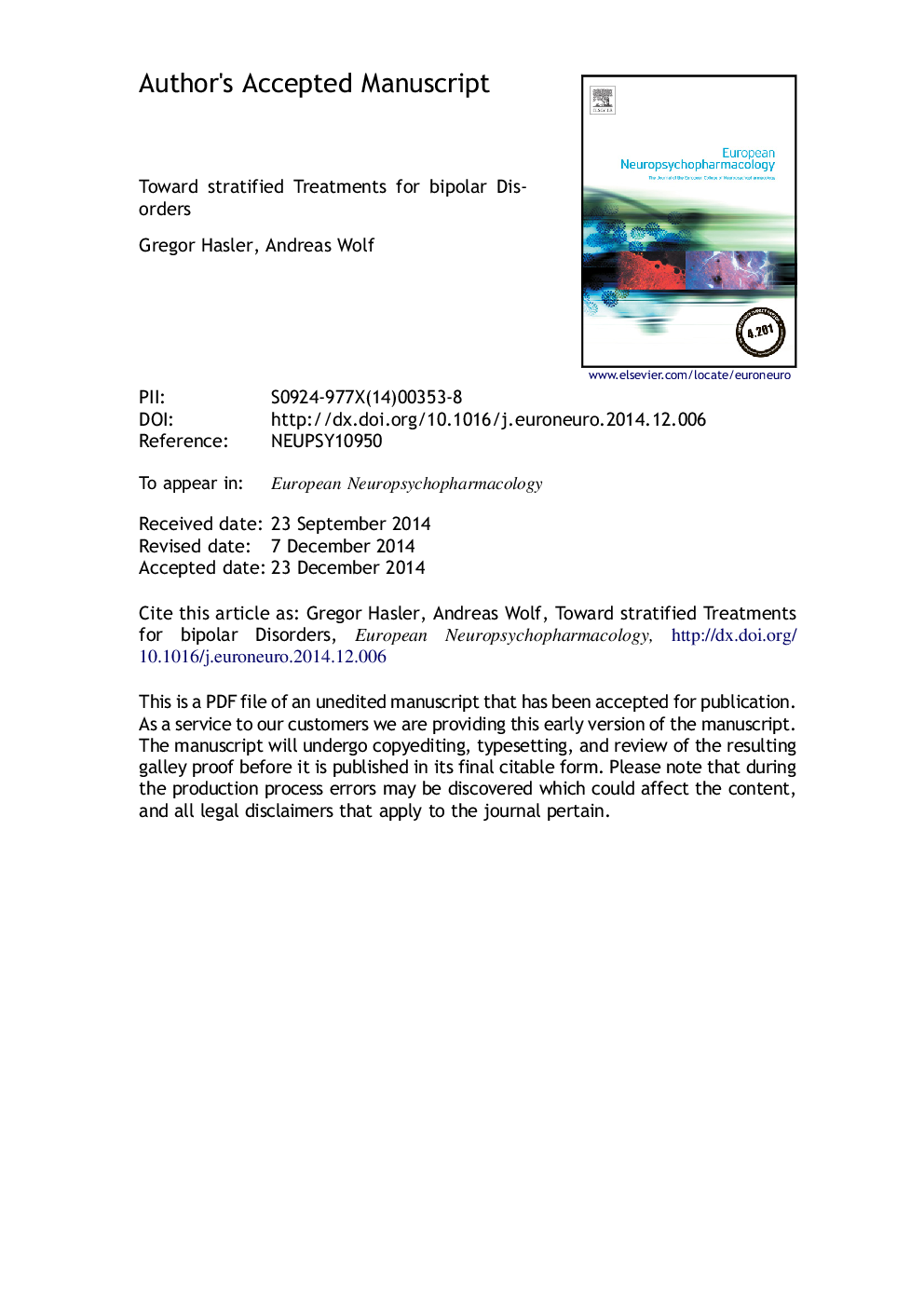| کد مقاله | کد نشریه | سال انتشار | مقاله انگلیسی | نسخه تمام متن |
|---|---|---|---|---|
| 10299088 | 539685 | 2015 | 32 صفحه PDF | دانلود رایگان |
عنوان انگلیسی مقاله ISI
Toward stratified treatments for bipolar disorders
ترجمه فارسی عنوان
به سوی درمان های طبقه بندی شده برای اختلالات دو قطبی
دانلود مقاله + سفارش ترجمه
دانلود مقاله ISI انگلیسی
رایگان برای ایرانیان
کلمات کلیدی
اختلال دو قطبی، دارو طبقه بندی شده، پزشکی شخصی پزشکی دقیق، بهینه سازی درمان،
ترجمه چکیده
در اختلالات دوقطبی، مرزهای تشخیصی نامشخص با افسردگی یک طرفه و اسکیزوفرنیا وجود دارد، عدم تطابق دستورالعمل های درمان، مراحل نسبتا طولانی آزمایش و خطا بهینه سازی درمان و افزایش استفاده از درمان ترکیبی پیچیده بدون شواهد تجربی است. این نشان می دهد که تعریف فعلی اختلالات دوقطبی براساس علائم بالینی نشان دهنده یک موجودیت ناهمگونی بالینی و علمی است. طبقه بندی درمان برای اختلالات دو قطبی مبتنی بر بیومارکرها و نشانگرهای بالینی پیشرفته مورد نیاز برای افزایش اثربخشی درمان در حال حاضر و بهبود شانس توسعه روش های جدید درمان است. این بررسی یک چارچوب نظری برای شناسایی بیومارکرها و خلاصه ترین نشانگرهای امیدوارکننده برای طبقه بندی در مورد اثرات مفید و اثرات درمان است. مشخصه های دولت و مرحله، آزمایش های عصبی روانشناختی، تصویر برداری عصبی، و نشانه های زیستی ژنتیکی و اپی ژنتیک با توجه به توانایی آنها در پیش بینی پاسخ به روان پزشکی خاص و روان شناختی مرتبط با اختلالات دوقطبی مورد بحث قرار می گیرد. تا به امروز، نشانگرهای قابل اطمینان از تحقیقات روانپزشکی و تاریخچه مشتق شده است، در حالی که هیچ نشانگر زیستی مشخص نشده است که به طور قابل اعتماد پاسخ های فردی را پیش بینی کند. این بررسی هر دو اهمیت مهارت های تشخیصی بالینی و نیاز به تحقیقات بیولوژیکی را برای شناسایی نشانگرهایی که به هدف قرار دادن درمان به طور خاص به زیر جمعیت بیماران دوقطبی اجازه می دهد که بیشتر از یک درمان خاص بهره مند شوند و احتمال بیشتری برای ایجاد عوارض جانبی واکنش ها
موضوعات مرتبط
علوم زیستی و بیوفناوری
علم عصب شناسی
روانپزشکی بیولوژیکی
چکیده انگلیسی
In bipolar disorders, there are unclear diagnostic boundaries with unipolar depression and schizophrenia, inconsistency of treatment guidelines, relatively long trial-and-error phases of treatment optimization, and increasing use of complex combination therapies lacking empirical evidence. These suggest that the current definition of bipolar disorders based on clinical symptoms reflects a clinically and etiologically heterogeneous entity. Stratification of treatments for bipolar disorders based on biomarkers and improved clinical markers are greatly needed to increase the efficacy of currently available treatments and improve the chances of developing novel therapeutic approaches. This review provides a theoretical framework to identify biomarkers and summarizes the most promising markers for stratification regarding beneficial and adverse treatment effects. State and stage specifiers, neuropsychological tests, neuroimaging, and genetic and epigenetic biomarkers will be discussed with respect to their ability to predict the response to specific pharmacological and psychosocial psychotherapies for bipolar disorders. To date, the most reliable markers are derived from psychopathology and history-taking, while no biomarker has been found that reliably predicts individual treatment responses. This review underlines both the importance of clinical diagnostic skills and the need for biological research to identify markers that will allow the targeting of treatment specifically to sub-populations of bipolar patients who are more likely to benefit from a specific treatment and less likely to develop adverse reactions.
ناشر
Database: Elsevier - ScienceDirect (ساینس دایرکت)
Journal: European Neuropsychopharmacology - Volume 25, Issue 3, March 2015, Pages 283-294
Journal: European Neuropsychopharmacology - Volume 25, Issue 3, March 2015, Pages 283-294
نویسندگان
Gregor Hasler, Andreas Wolf,
